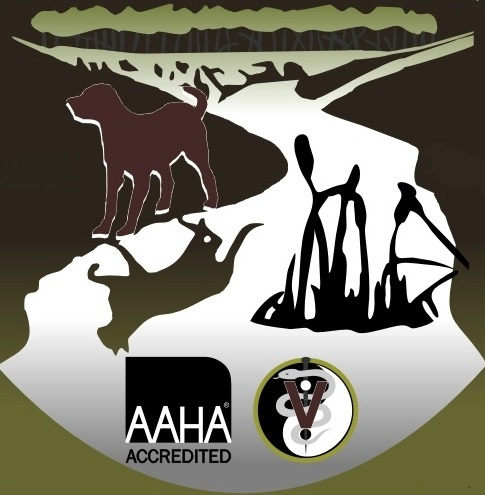Protect your Pets from the Dangers of Hunting Season
Bow Bottom Veterinary Hospital
www.bowbottomvet.com
Dr Julie Schell BSc(Hons), DVM, CVA, CVCHM, CVC
The beauties of nature during the changing season from fall to winter can be marred by the dangers of hunting season. It is important to be aware that currently in the province of Alberta, hunting season including moose, elk, and deer is allowed in municipal districts such as Rocky View and it begins in the fall and extends all the way into December. Rocky View includes suburban areas such as Bearspaw, Springbank, Balzac, Indus, Bragg Creek, Elbow Valley, Bottrel, Madden, Cochrane Lake, Kathyrn, Keoma, Delacor, Dalroy, Conrich, Langdon, and Dalemead. These areas are inhabited by many people, and homes are often very close together, on small parcels of land. There are many dogs and cats that live in these areas. The government allows shooting to occur as long as it is done 200 yards (0.05 acres) or more away from occupied buildings.
Unfortunately, dogs may find bits of carcases left in forests or fields. This can include the legs and organ meats of the carcass. Dogs, with their keen sense of smell, are able to detect these items from long distances. They will eat or at least grab these carcass pieces in their mouths. Dangers include bacterial infection with dangerous bacteria such as E. coli, Salmonella. Many illnesses and even death can occur due to pancreatitis.
The carcass may also have pieces of bullet fragments. If ingested, this bullet shrapnel may act as a foreign body and block gastrointestinal areas. If chemicals such as lead or zinc are in the bullet, metal poisoning can occur leading to grave illnesses that may be difficult to diagnose and treat.
People will also offer dogs organ meats of the carcass. It is important to note that several species of animals such as deer, moose, elk, and mice harbor deadly parasites such as Echinococcus tapeworms, and are intermediate hosts. Dogs, wolves, coyotes are definitive hosts, and if they ingest the meat of deer, moose, elk, mice, they can become infected and shed the parasite eggs into their environment during defecation. Humans can then become infected through this cycle. These parasites will lodge in the brain, liver, spleen and other organs of humans, who are considered incidental hosts, rendering them with serious health concerns such as brain damage. It is best to not feed your dogs meat from wild animals, especially the liver and other organ meats. If you are home-cooking recipes for your pet, ensure that the meats are cooked thoroughly to help kill the bacteria and parasites or do not feed that meat at all. Dogs are the definitive hosts of Echinococcus, and they will shed the eggs in their feces that will infect other humans and animals. Thus, monthly deworming is vital for all dogs, even dogs who do not hunt and do not leave the city. This is because many animals will be in contact with contaminated fecal material from infected dogs, including mice, and deer. If a city dog then eats a mouse or other animal that is infected, they can become carriers and shedders of the Echinococcus and through their feces transfer it to their human owners.
Not only are pets susceptible to the parasites and bacterias in wildlife meats, but they are often not used to eating such rich, foreign food substances and they can develop deadly illnesses such as pancreatitis. Eating raw or cooked bones and antlers can often chip your pet’s teeth to the point of requiring root canal or extraction. Bones and antlers can also cause intestinal lesions and indigestion and even death from foreign body entrapments or choke.
Aside from bacterial related gastrointestinal infections and parasites, there are other dangers. Some dog owners believe that just because their dog’s breed has been used for hunting purposes that they will naturally have the ability to hunt. It is important to note that hunting dogs require intense training with the skills of professional handlers before it is safe for them to take part in the hunt. Many dogs bred for hunting may not enjoy it, and may have fears of swimming. If your dog truly does not enjoy swimming and hiking through the wilderness you should choose other activities that they do enjoy such as skijoring, agility, and indoor play sessions.
Many dogs are paralyzed with fear by the alarming, loud sound of a gunshot. The dangers of gunshots include deafness. Dogs also can be hit by stray bullets. Bright colored jackets and collar lights for dogs will help people differentiate between dog and wildlife, and will also help people find their dogs in the wilderness. Life jackets for swimming dogs help prevent drowning.
Protect your pets as much as possible by keeping them near your house and on leash during hunting season. If you own an acreage, you can post signs that read “No Hunting and No Trespassing” so people will know not to shoot on your land.
If your dog is venturing into areas where wild life inhabits, it is vital that they are protected from the disease and pestilence they will be exposed to such as rabies virus, distemper viruses, ticks, mosquitoes, gastrointestinal parasites and bacterias. Your pet must be protected from these viruses via vaccinations. Deworming and tick and flea control is vital.
If you are in a coyote rich area, there are ways to also protect your dog from these attacks. This new vest is an excellent way to protect dogs from the dangers of coyote attacks, and is great for pets who go to offleash parks or hiking spots where coyotes frequent :https://www.coyotevest.com/
For more information on hunting bylaws, and for ways to help improve safety during hunting season, contact Fish and Wildlife at http://srd.alberta.ca/FishWildlife/FishingHuntingTrapping/AlbertaRegulations/Default.aspx
For more information on protecting your pet, contact us at welcome@bowbottomvet.com or
403 278-1984 and check out www.bowbottomvet.com


